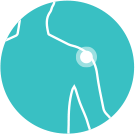Distal Biceps Tendon Tear or Rupture (at Elbow)
The biceps is a muscle located in your upper arm. It is connected to the bone by three tendons, two at the shoulder and one at the elbow. A distal biceps tendon rupture at the elbow occurs when the tendon connecting the biceps to the bone is torn or detached from the bone.
For information on the proximal biceps tendon, click here.
What causes a Distal Biceps Tendon Tear?
The most common cause is a sudden injury and is rarely associated with other medical conditions.
Injury occurs when the elbow is forced straight against resistance, such as trying to stop a heavy object from falling, or the reverse, when trying to lift an object that is too heavy for that arm alone.
When a biceps tendon at the elbow ruptures, the other arm muscles will compensate so it doesn’t always stop the elbow moving through a full range of motion.
What are the Signs and Symptoms of a Distal Biceps Tendon Tear?
Symptoms of a biceps tendon rupture at the elbow include:
- Swelling at the front-side of the elbow
- Visible bruising at the elbow and forearm
- A gap in the front of the elbow from the absence of the tendon
- A change in the appearance of the biceps muscle (just above the elbow)
- Feelings of weakness when bending the elbow
- Weakness when twisting the forearm
How is a Distal Biceps Tendon Tear Diagnosed?
Mr Soong Chua and his team will begin with your medical history and a physical examination to assess your pain and range of movement before moving onto imaging tests such as x-rays, ultrasound or an MRI scan to see if the tear is partial or complete.
What are the Treatment Options for a Distal Biceps Tendon Tear or Rupture
Mr Soong Chua may suggest different treatments depending on how severe the tear is. Non-surgical treatment could include:
- Rest
- Nonsteroidal anti-inflammatory medication
- Activity modifications
- Physiotherapy to try to regain strength and range of motion
To regain full strength and function, surgery to reattach the tendon is usually necessary. Mr Soong Chua and his team will then consider a range of surgical options to repair the bicep tendon.





